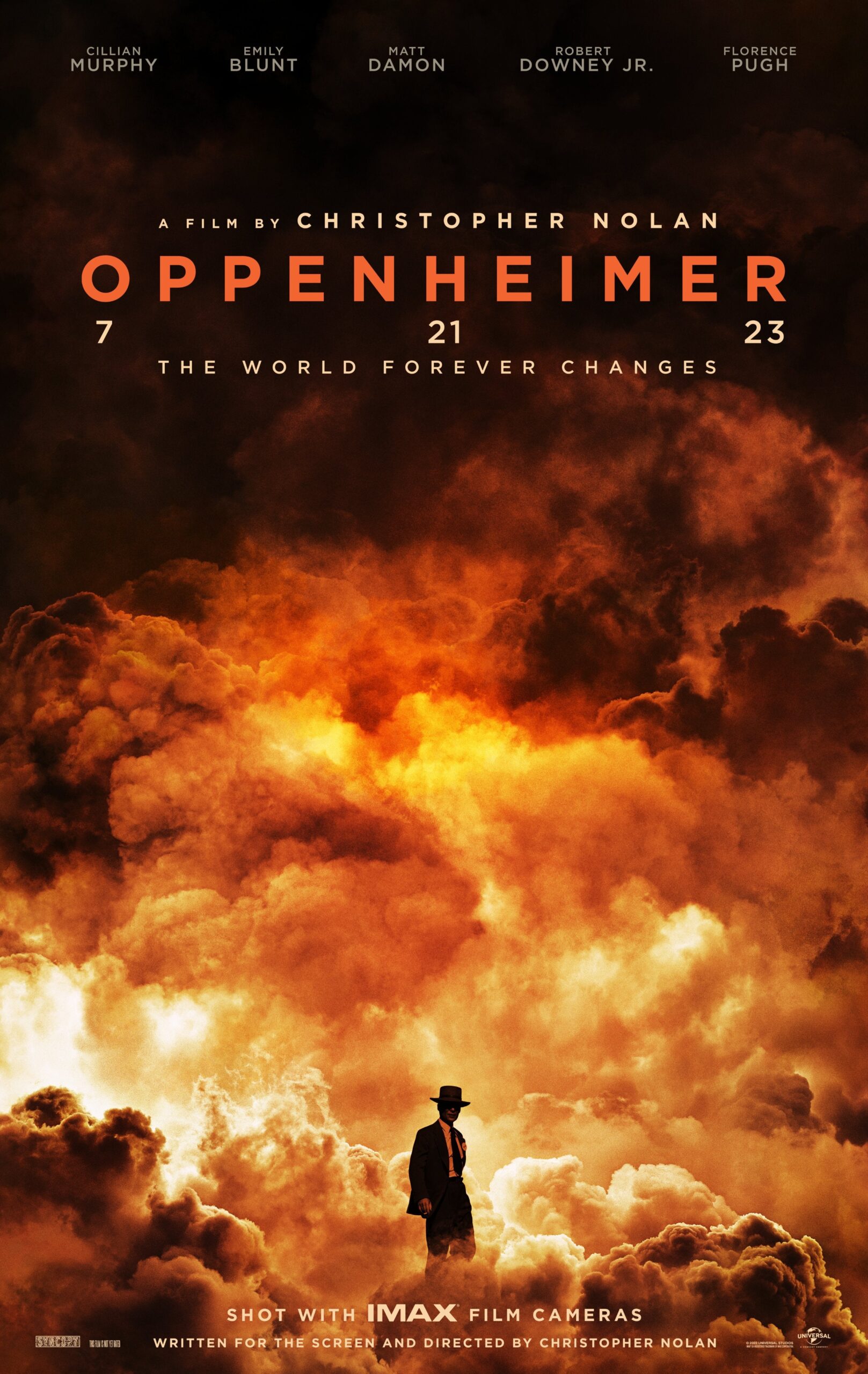
24 Jul Oppenheimer Review
OPPENHEIMER
dir. Christopher Nolan, starring Cillian Murphy, Robert Downey JR., Emily Blunt, Florence Pugh, et al.
During World War II, Lt. Gen. Leslie Groves Jr. appoints physicist J. Robert Oppenheimer to work on the top-secret Manhattan Project. Oppenheimer and a team of scientists spend years developing and designing the atomic bomb. Their work comes to fruition on July 16, 1945, as they witness the world’s first nuclear explosion, forever changing the course of history.
Starring Cillian Murphy, the enormity of the responsibility that lay on his shoulders is unthinkable. While not his first leading role, not by far, it’s Murphy’s first for director Christopher Nolan after so many opportunities to play the bridesmaid. Thankfully, the veteran is more than up to challenge, tackling the role of J. Robert Oppenheimer with a performance that initially radiates confidence, self importance, and arrogance while eventually giving way to crippling doubt and fear of the future. All these emotional beats Murphy lands with the grace and firmness of a talented gymnast, delivering a career-defining performance and cementing him as one of the century’s great leading men. In an era where IP reigns supreme and moviegoers flock to screens not to see the actors and actresses but the characters they portray, Murphy stands out as having one of the best performances that is at times incredibly nuanced and layered and at others deeply outward.
Murphy’s isn’t the only career-defining performance, however. Robert Downey Jr. offers up what is not only his best serving since his emotional exit from the Marvel Cinematic Universe, but his best acting to date over his four decade long resume. While not having as much screen time as Murphy, Downey Jr. almost manages to steal the entire movie from him, giving the audience a firm reminder that while the last decade and a half had him in front of green screens, Downey’s ability to inhabit a character fully is his greatest strength. Whether it’s a wisecracking playboy in Iron Man or an alcoholic journalist in Zodiac, he’s always been a rare talent, a diamond both in the rough and shining brilliantly amongst other diamonds (such as the case here). The third act gives him the most to do, including a scene chewing monologue that brings a number of narrative threads neatly together while revealing crucial information. Such exposition can at time be something of a slog to get through, but thanks to the strength of Nolan’s writing and Downey Jr.’s performance (in what could be considered the best scene of the film), the result is a riveting looking at businessman Lewis Strauss and what drives him.
Throughout the entirety of his career, Chris Nolan has been constantly (rightfully) plagued by condemnation of his female characters. Whether fridged (Memento, The Prestige, Inception) or used merely as tools (Tenet), Nolan has very little in the way of defense outside of Anne Hathaway and Jessica Chastain, both seen in Interstellar. Here in Oppenheimer, Nolan manages to somewhat sidestep those accusations, giving us a killer Emily Blunt performance as Oppenheimer’s wife Kitty and a more muted, more Nolan-esque turn from Florence Pugh as Jean Tatlock, Oppenheimer’s mistress. While Nolan is able to somewhat eschew the criticisms of weak female parts (Pugh has a mere handful of scenes, while Blunt is sidelined until a third act powerhouse scene), the filmmaker’s shortcomings when dealing with women are still present. It’s arguable that the women here have more to do than in other films due to the fact that they were real people in close orbit to Oppenheimer, that Nolan had no choice but to up his game in this regard, but nevertheless something of an effort was made. Pugh’s performance as a complicated and controversial spurned lover of Oppenheimer’s is impactful for the short amount of time she’s on screen. With little more than two scenes, Jean’s presence is felt in certain parts of Oppenheimer’s life, both before and after her death. Blunt’s Katherine ‘Kitty’ Oppenheimer, isn’t her best performance (Sicario still holds that regard), but might contain her best scene of acting in her oeuvre. Coming in strong after sitting quiet for much of the runtime, Blunt showcases why Nolan and his team cast her. With this level of performance, audiences can only pray that Oppenheimer is just the first of many collaborations between her and Nolan.
Written, directed, and co-produced by Nolan, Oppenheimer continues his trend of technical dexterity within a storytelling frame. Often accused of creating movies and characters that are cold and emotionless, Nolan proved any naysayers wrong by delivering a vehicle for a powerful inward performance by Murphy and outward performance by both Blunt and Pugh. Bouncing between three eras of history (a time honored and well worn plot device used by Nolan) while taking care to make them distinct enough that any viewer paying attention never feels lost or confused makes for a heightened sense of tension; just as information is about to be revealed, the story shifts to a different perspective. In this manner Nolan manages to explore the life of J. Robert Oppenheimer in such a way that lets him speculate as to how the race to make such a destructive force was ran against the Germans while laying down in concrete other aspects of history. The subjective/objective approach keeps the story fresh while managing to create an additional layer of complexity to the film’s subject, a man who was already plenty complex to start with.
Oppenheimer’s achievements behind the camera deserve just as much praise as the ones in front of the lens. At three hours a one minute, the pacing is immaculate; from establishing who Oppenheimer was, transitioning into the atomic race, and ending on what’s become of him and his legacy, at no point is there a dry spell or a need to glance at a clock. Between the shifting time periods, the steam is never lost nor does Nolan ever take his foot off the pedal while leading the audience to the inevitable. When that time comes, the event the entire story has been building towards finally approaches, Nolan treats it with a deft reverence, eschewing the low hanging fruit of going big and loud and instead takes a moment to step back and respect both the technological achievement and raw amount of monstrosity that Project Manhattan unleashed upon the world. With no small amount of help from red hot composer Ludwig Göransson, Oppenheimer, much like the atom bomb, is a spectacle to behold and a terror greater than the sum of its parts.
Overall, with an already unthinkably impressive resume of movies beloved by film nerds across the globe, Christopher Nolan has once again managed to outdo himself. A harrowing drama, a political thriller, and a ticking time bomb of suspense all rolled into one, the film manages each of these tones with the ease of a filmmaker who is operating at the absolute summit of his powers. A career shattering performance from Cillian Murphy, Downey Jr.’s best work ever, and a scene stealing Emily Blunt bolster a finely crafted story, masterful technical work, and stirring score. Simply put, this is handily one of the best told stories of the year. Oppenheimer is currently in theaters.
Review by Darryl Mansel


No Comments